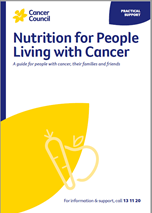- Home
- About Cancer
- Living well
- Complementary therapies
- The role of exercise and nutrition
- Should I change what I eat?
Should I change what I eat?
People often consider changing their diet to help their body cope with the effects of cancer and its treatments, and to give themselves the best chance of recovery. Some complementary therapies incorporate general dietary advice, while others have their own specific approaches to diet.
While it’s best to get vitamins and minerals from eating whole foods, they are sometimes taken as supplements. For example, doctors may advise some people to take calcium or vitamin D supplements during and after treatment. If you were taking supplements before treatment, ask your cancer specialist if it is safe to continue.
Unproven diets
Some people claim that a particular diet or way of life can cure or control cancer on its own. Often these diets are promoted on social media or in the traditional media.
There are no special foods, diets or vitamin and mineral supplements that have been scientifically proven to cure cancer. There’s also no research that shows any particular foods can lower the chance of the cancer coming back.
Following an unproven diet may mean you don’t get enough energy (kilojoules/calories), protein, fat, carbohydrates, vitamins and minerals. This may affect your energy levels, cause unwanted weight loss and fatigue, and weaken your immune system.
Cutting out whole food groups and losing weight may also contribute to malnutrition. This may make it harder for you to cope with treatment and may slow down your recovery. You can become malnourished regardless of how much you weigh.
→ READ MORE: Taking care with special diets during treatment
Video: How to eat well after a cancer diagnosis
More resources
Dr David Joske, Clinical Haematologist, Sir Charles Gairdner Hospital and PathWest, Chairman and Founder Solaris Cancer Care Foundation, Clinical Professor of Medicine, The University of Western Australia, WA; Australasian Integrative Medicine Association (AIMA); Dr Robert Blum, Clinical Director, Cancer Services, Bendigo Health, NSW; Sally Brooks, Senior Pharmacist, Medicines Information, Peter MacCallum Cancer Centre, VIC; Dr Suzanne Grant, Senior Research Fellow, NICM Health Research Institute, Western Sydney University, and Chris O’Brien Lifehouse, NSW; Prof Danforn Lim, Adjunct Professor and Advisory Board Member, NICM Health Research Institute, Western Sydney University, and Adjunct Professor, UTS, NSW; Christina Line, Statewide Services Senior Coordinator, Cancer Council WA; Jen McKenzie, Physiotherapist (Lymphoedema) and ESSA Accredited Exercise Physiologist, The McKenzie Clinic, QLD; Simone Noelker, Wellness Centre and Pastoral Care Manager, Ballarat Regional Integrated Cancer Centre, VIC; Dr Nirzari Pandit, General Practitioner, RACGP Specific Interests Integrative Medicine Group, NSW; Georgie Pearson, Consumer; Cris Pirone, Counsellor, Cancer Council SA; Dr Elysia Thornton-Benko, Specialist General Practitioner, and UNSW Research Fellow, NSW; Kirsty Trebilcock, 13 11 20 Consultant, Cancer Council SA.
View the Cancer Council NSW editorial policy.
View all publications or call 13 11 20 for free printed copies.

